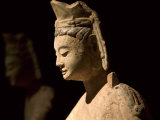Cambridge, MA. I recently was asked to offer a closing prayer at a parish event where the speaker was Professor Paul F. Knitter, a distinguished Catholic theologian and the Tillich Professor of Theology, World Religions and Culture at Union Theological Seminary in New York. Paul had given a fine presentation of his inviting and provocative book, Without Buddha I Could not be a Christian (One World, 2009), and my prayer was to be the conclusion of the event. 
Given the interfaith and exploratory nature of the event, I thought that in the closing prayer for this ecumenical and interfaith gathering, I would bring together, in one utterance, the Christian and Buddhist streams of prayer. I did so by weaving together a famous prayer attributed to St. Francis of Assisi — well known to readers of this blog, I am sure — with a version of the vow of the Bodhisattva (a kind of Buddhist saint who vows the protection of all beings, and delays her or his own liberation until all beings have been liberated). There are many versions of this vow on the internet, but I took mine from a very nice site that offers several translations of this vow.
For the sake of that evening's prayer, I edited both in small ways, but the editing/omissions do not, I think, detract from the overall benefit gained by weaving them together. The reaction at the parish was quite positive, so I thought I would share the results with you here. I will not offer any heavy-duty theology of the melding, nor express any views at the moment on praying in two traditions at once — but would rather let the text speak for itself. You might even try reading it aloud:
The Prayer of St. Francis with the Bodhisattva Vow
Lord,
Make me an instrument of your peace.
Where there is hatred, let me sow love.
Where there is injury, pardon.
Where there is doubt, faith.
Where there is despair, hope.
Where there is darkness, light.
Where there is sadness, joy.
May I be a safeguard for those who have no protection,
A guide for those who journey along the way;
For those who wish to go across the water,
May I be a boat, a raft, a bridge.
May I be a home port for those who yearn for landfall,
And a lamp for those who long for the light;
For those who are tired, may I be a resting place,
For all who need help, their servant.
O Divine Master,
Grant that I may not so much seek
To be consoled, as to console;
To be understood, as to understand;
To be loved, as to love.
Like the great earth itself and other eternal things,
Enduring as the sky itself endures,
For the boundless multitude of living beings,
May I be the ground and vessel of their lives.
For every single thing that lives,
In number like the boundless reaches of the sky,
May I be their sustenance and nourishment
Until they pass beyond the bounds of suffering.
For it is in giving that we receive.
It is in pardoning that we are pardoned.
It is in dying that we are born to Eternal Life.
Amen.







I practice centering prayer and often look to Buddhism for insights and parallels. I can understand the notion of having to be a Buddhist before becoming Christian.
Comment: Mr McCullough - clumsy on purpose! there is no point in manufacturing seamlessness. But the 'music' works. FXC